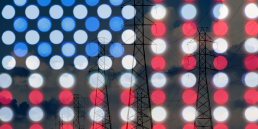Memorial Day Reminds of the Need for Action, Sacrifice
By Col. Timothy Connors (U.S. Army Ret.)
As the nation celebrated Memorial Day and honored those who made the ultimate sacrifice to protect our country, it is fitting that this year’s recognition also saluted members of the first-responder, medical and scientific communities who have given their lives battling the coronavirus pandemic.

And while the onset of the coronavirus pandemic caught us unprepared, it is encouraging to see that Congress and the Administration are taking on another potential pandemic that we have been warned about repeatedly for at least the last three years – the electric pandemic. The ensuing economic devastation that would result from a successful, large scale cyberattack on the U.S. electric grid is unthinkable.
In March, the Cyberspace Solarium Commission issued a lengthy, detailed report on needed improvements to key elements of our critical national infrastructure. The findings of the Commission are being turned into legislation, and Congress should soon have an opportunity to authorize important infrastructure improvements, including to the electric grid, that will protect our economy, public health and safety, and our national security.
The Administration has also seen the need for urgent action, issuing an Executive Order on May 1st designed to, among several important issues, address dangerous cyber-related vulnerabilities in the electric sector supply chain. The order highlights a looming threat that was the subject of a recent report from Protect Our Power and Ridge Global that examined cybersecurity risks in the power industry’s supply chain and called for a collaborative among buyers, sellers, and regulators to build an acceptable supply chain protocol that would assure the integrity of the industry’s supply chain.
In Congress, Senators Lisa Murkowski (R-AK) and James Risch (R-ID) recently introduced the Energy Infrastructure Protection Act, a far-reaching bill designed to boost protections for critical electric infrastructure and provide for a greater flow of critical information in a secure manner between electric utilities and regulatory agencies, and ultimately provide for a more secure grid.
Importantly, the bill expands the definition of critical electric information to include information related to “critical energy infrastructure,” which would include systems and assets (1) comprising the bulk power system; (2) owned by electric utilities; (3) allow for the transportation of fuel, electricity, water, steam, heat, coal or any commodity that is used in the provision of electricity service; (4) facilitate (a) the delivery of electrical energy to consumers, (b) wholesale transactions in electrical energy, and (c) the import or export of electrical energy; (5) all pipelines for the transportation of oil; and (6) natural gas pipelines.
This significant expansion of “critical energy infrastructure” will help ensure that all the components of our energy delivery systems are afforded a level of protection commensurate with the broad, sophisticated, and evolving threats we face in today’s world.
And the most recent legislative proposal, dubbed the Cyber LEAP Act, is sponsored by Senators Roger Wicker (R-MS), Jacky Rosen (D-NV) and Cory Gardner (R-CO), and would “help foster innovation and collaboration as the public, private, and academic sectors work together to address the cybersecurity challenges of our time.”
The bill directs the Commerce Department to establish “cybersecurity grand challenges” modeled after the recommendations of the Cybersecurity Moonshot Initiative from 2018. The challenges would be centered on significantly raising the cost of carrying out a cyberattack on the U.S., improving the cybersecurity workforce, emerging technologies, digital identity, and federal government cybersecurity, and could include prize competitions.
Each of these proposals has merit, and it will be time well spent for Congress and the relevant agencies to pursue these cybersecurity initiatives with a sense of determination and urgency. It is not an exaggeration to suggest that our economic well-being and our national security depend on prompt and effective action by our elected leaders, federal and state agencies, utilities, and other companies that are part of our critical infrastructure.
As we are reminded of the sacrifices made by others that allowed our great nation to grow and prosper, and the current sacrifices made by those fighting the pandemic, we should also be reminded that it will take additional sacrifice to strengthen our national cybersecurity and protect our vital electric grid — upon which all other elements of our national infrastructure depend — and it is time to get on with that job. We owe that to those who have sacrificed before us.
Timothy Connors a retired U.S. Army Colonel. He served in the Army Reserve Counterterrorism Unit at the U.S. Department of State and as the Director of Policing Terrorism at the Manhattan Institute in New York City. Connors serves on the Advisory Panel of Protect Our Power, a not-for-profit organization whose mission is to strengthen the security and resilience of the U.S. electric grid.
Tim Connors
Author Bio